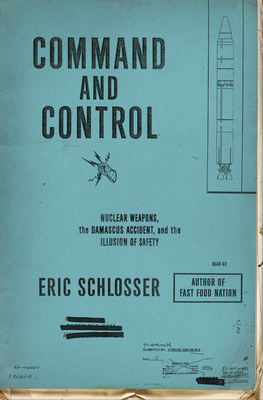 I just finished reading a fascinating book: Command and Control, by Erich Schlosser.
I just finished reading a fascinating book: Command and Control, by Erich Schlosser.
The subtitle may be somewhat more revealing: “Nuclear Weapons, the Damascus Incident, and the Illusion of Safety”.
It is a book about the safety (or lack thereof) of America’s nuclear weapons. And it was an eye-opening read.
Yes, I knew that there were some incidents in the past during which nuclear weapons were lost, damaged, or destroyed. Yes, I knew that there were incidents of false alarm, when early warning systems in the United States or the Soviet Union indicated an attack even though no such attack was under way.
But like many, I assumed that the weapons themselves were designed to be inherently safe. That by design, the weapons were secure against accidental detonation (even during a serious accident such as the crash of a bomber aircraft) or unauthorized use.
What I did not expect to read about were weapons that could be detonated by a stray electrical signal. A military leadership that resisted anything that could stand in the way of successful deployment of a weapon, including the installation of coded devices (“permissive action links”.) Or even when such coded devices were ultimately installed, in effect sabotaging them by using the code “00000000” everywhere. What I did not expect to read about were accidents involving nuclear weapons where only a single switch, prone to failure, stood between the world and an accidental thermonuclear explosion.
The book uses a specific incident, the in-silo explosion of a Titan II missile in 1980, as a framework to tell its story. I was shocked by the events leading up to the accident as well as the chaotic, panicky reaction afterwards (including pathetic attempts to hide systemic errors by trying to blame low-ranking airmen for the accident).
The book is mostly about America’s weapon systems, but it is not meant to imply that foolish attitudes towards the deadliest weapon ever invented by humanity are uniquely American. A famous line in the movie classic, Dr. Strangelove, is when Dr. Strangelove yells at the Soviet ambassador in frustration, “Yes, but the… whole point of the doomsday machine… is lost… if you keep it a secret!” In the 1980s, the Soviet Union finished construction of the Perimeter system, an automated system designed to respond with a massive nuclear strike automatically in case the Soviet leadership was incapacitated and the system detected nuclear explosions on Soviet soil. In other words: a doomsday machine. The system is believed to remain operational to this date.
And they kept it a secret.



 Reader’s Digest recently conducted
Reader’s Digest recently conducted 

